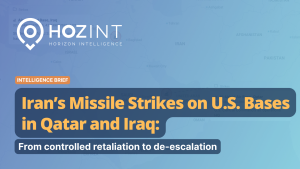On June 22, thousands of farmers gathered to protest the Dutch government’s proposed nitrogen policy in Stroe, Gelderland. The rally was called by the farmers’ collectives Agractie and Farmers Defense Force. Since this incident, farmers have held multiple demonstrations. Most prominently, they have blocked multiple highways and border transit points with tractors, and by burning hay bales, tires, and waste. Farmers have also blocked supermarket distribution centers of Aldi and Jumbo. Protests have been recorded at airports of Amsterdam-Schiphol (AMS), Eindhoven (EIN), and Rotterdam-The Hague (RTM). On July 6, commercial flight operations were suspended for the day due to farmers’ protests at Groningen (GRQ). During certain periods of demonstrations, emergency ordinances were introduced in the towns of Apeldoorn, Hierden, and Harderwijk to maintain public safety and order.
Analysis
The farmers are protesting against the government’s proposed nitrogen policy, which plans to reduce nitrogen oxide and ammonia emissions by between 12% and 70%, depending on the province. To meet these goals, an estimated 11,200 farm operations will have to close. 17,600 farms will have to significantly reduce their livestock and use of artificial fertilizers.
The policy is aimed at reducing nitrogen emissions to meet climate goals and protect wild habitats. Farmers say the policy unfairly targets them, and it will drive them out of business, forcing them to voluntarily sell their land or have it seized by the government.
Protests have regularly occurred in the Gelderland and Overijssel provinces. The most regular form of protest has been blocking highways with burning hay bales, tires, and waste material. The A1 highway is the most regularly blocked highway. The blockades of multiple supermarket distribution centres are another method of disrupting supply chains, related to food and household goods. Therefore, the logistics and transportation sector has been negatively affected. Road transport is predominantly affected due to blockades, burning hay bales, and slow-moving tractor convoys. The aviation sector has been partially affected by demonstrations at airports, which have revealed the potential to disrupt the flow of passengers and cargo on commercial flight operations. The protest tactics so far are directed toward paralyzing key components of the economy, to gain public attention and coerce the government into amending the nitrogen policy.
It has been difficult to predict when and where road blockades will occur because they are not announced in advance. However, information has circulated in advance via social media channels about a few large rallies, for example in Amsterdam on July 23. The protests have remained peaceful, although there was at least 1 instance where police shot at protestors in Heerenveen, Friesland.
The protestors blame the “globalist agenda” and “global elites” for imposing unfair policies. This rhetoric has gained traction among right-wing political groups in Europe and North America.
Politicians such as Marine Le Pen and Geert Wilders have voiced support for the farmers’ actions. They are leveraging the unrest against the nitrogen policy to criticize the EU’s climate change policies, and to promote Euro-skepticism. Moreover, right-wing groups are promoting conspiracy theories that the government is planning to seize farmers’ land to house refugees and migrants. There have also been solidarity rallies by farmers in Germany, Italy, Spain, Poland, and Canada. Consequently, the protests are shaping the political discourse in several countries across Europe.
Forecast
Negotiations between farmers’ groups and the Dutch government are stalled. So, it is likely that the protests will continue. It is possible that there are more incidents of violence at the protests, as farmers may become more frustrated regarding stalled negotiations. Therefore, it is possible the impact of the demonstrations will rise over time.
There are several implications of continuing unrest among farmers. It is likely the transport and logistics sector will continue to be negatively impacted, due to traffic delays, road closures, and blockades of distribution centres and airports. It is possible that road accidents will increase due to debris left on roads by burning hay or waste.
Protesting farmers will possibly escalate their tactics to restrict food and dairy supply. Indications of this escalation are given by the blockades of supermarket distribution centres. Such restrictions will negatively impact agro-businesses, food supply chains, and food security domestically, and in Europe. It is possible protests will escalate to blockade major cities like Amsterdam. Moreover, rallies and work stoppages in support of farmers will possibly occur across sectors. These scenarios will negatively impact business continuity across multiple sectors.
It is possible that the actions in the Netherlands will continue to spark solidarity protests in other countries, especially Germany, Italy, Spain, Poland, and Canada. Finally, it is likely the Dutch farmers’ demonstrations will continue to strengthen the political agenda for far-right, Euro-skeptic, and anti-globalization political groups in Europe. These groups may generate further political risk for EU-wide business operations in the long term.
By Mihir Vikrant Kaulgud, Risk Intelligence Analyst at Hozint – Horizon Intelligence




